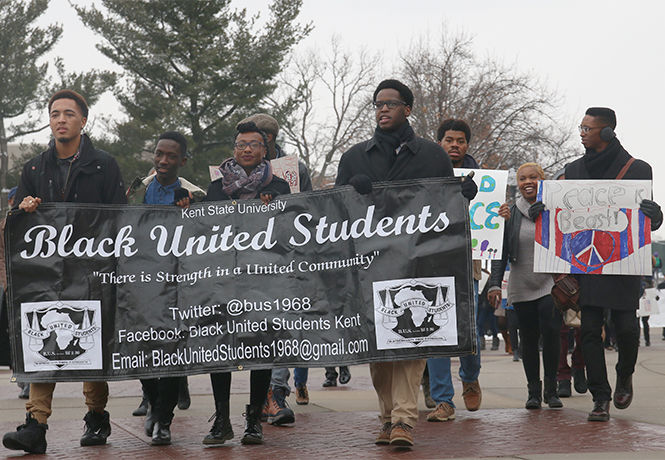Black United Students uses influence for positive change
Students and members of Black United Students march from Black United Student’s home in Oscar Ritchie hall to the Student Center for a speech from civil rights leader and activist Julian Bond for the 13th annual Martin Luther King Jr. Celebration on Thursday, Jan. 22, 2015.
February 4, 2015
“Unite and stand up.” When students at Kent State heard these words of advice in January 1967, they formed a student group that quickly gained influence not just on campus, but around the world.
Originally an underground movement, Black United Students became a registered student organization at Kent State in April of 1968, according the BUS website. The words of encouragement to unite came from Henry Austin, then public relations director of the Deacons of Defense, a group of African-Americans formed to protect members of the Congress of Racial Equality against Ku Klux Klan violence, when he was invited to speak at Kent State by the NAACP.
In order to fight for social justice and also in response to the assassination of Martin Luther King Jr., black students at Kent State united and formed BUS, one of the largest student organizations on campus.
As the black student population at Kent State increased, more students began to question why the university did not provide events and activities that catered to their race and culture. Students demanded a hub for black culture and education, said Mwatabu Okantah, an associate professor in the department of Pan-African Studies.
“This was based on the idea that, you could come to a university and nowhere in the curriculum were the contributions of black people discussed, acknowledged…any of that,” said Okantah, who was a student at Kent State in 1970.
In November 1968, BUS members staged a walkout when the Oakland Police Department, which was fighting the militarization of the Black Panther Party in California, began recruiting at Kent State.
The university, according to the department of Pan-African Studies’ website, was forced to negotiate with the students, and these negotiations established the Institute for African-American Affairs (1969), Center for Pan-African Culture (1970) and the Department of Pan-African Studies (1976).
CPAC, also known as “the house that BUS built,” is the result of students’ efforts to establish a black studies curriculum and cultural hub, which did not exist.
According to the BUS website, the students demanded an entire building dedicated to black men and women, and in 1977, the building previously used as the student union was rededicated as Oscar Ritchie Hall. Ritchie was the first African-American faculty member at Kent State.
“In many ways, we’ve made a lot of changes over the years, but sometimes we still need to make some of those basic changes. And BUS is out there advocating for that still,” said Idris Kabir Syed, a lecturer in the department of Pan-African Studies. “Over that 40 plus years, they’ve done a lot, and I would argue that they’re still the major group on campus pushing a lot of the major issues that need to be pushed.”
Syed said he was a student in 1989. While working under the African affairs chair of BUS, Syed said he was also assistant editor and later editor of UHURU magazine, the publication centered on black culture and history.
It wasn’t just physical changes to campus and the student body that the organization has influenced. In February of 1969, BUS proposed the extension of Black History Week into a full month, making the student group the first in the U.S. to make this kind of proposal. The following year, the first observation of the nationally-known month celebrating the culture, history and contributions of African-Americans was held at Kent State.
Today, the organization claims to take a stand on all social, cultural and political issues among blacks. It co-hosted a colorism panel in the fall with Focus on the Future, celebrated its annual Renaissance Ball and coordinated protests in response to the numerous cases of police brutality within the past year.
“To be honest, Black United Students was founded to advocate for black students and that is what we do,” said Matthew Thompson, the current president of BUS. “Is acknowledgement good and greatly appreciated? Yes. But the efforts are to create a platform for black students to excel and thrive. Honors will come, but community is always first with Black United Students.”
Contact Daisha Overstreet at [email protected].












